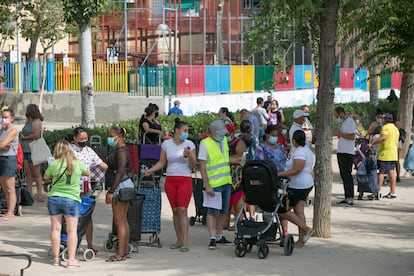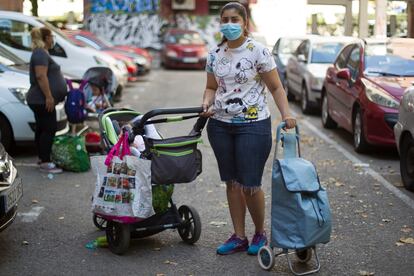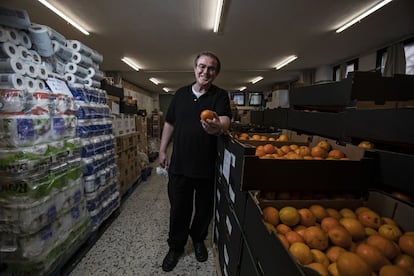A year and a half on from pandemic, 190,000 people in Madrid still depend on food donations
While some are bouncing back from the coronavirus crisis, thousands of families continue to rely on neighborhood associations and other charities for their survival

It’s summer but, for many in Madrid, vacations are all about looking at an old photo of the beach on their cellphone. “I’m from the Caribbean,” says Isolina Medina. “How can I not miss going on holiday if we have the beach on our doorstep where I come from!”
The last time Isolina put a toe in the Mediterranean Sea was three years ago when she spent three days in Valencia. Accepting an invite from a friend, she went with her daughter Vasilida, her three grandchildren and her great-granddaughter. Isolina, 68, has been living in Madrid for half her life. She emigrated from the Dominican Republic in the 1990s to seek a better life for her family. Now they all share a rented apartment in Orcasitas, a Madrid neighborhood of 23,000, half of whom are from Latin America and the Caribbean. “The pandemic wanted to finish me off, but it couldn’t,” she says.
Vasilida has cooked for many households and has been a model housekeeper. Her cooking is great. “Anything. What do you want?” she laughs. But the coronavirus pandemic turned her life upside down. Her whole family came down with the virus together. And they all lost their jobs. Nearly a year and a half later, her daughter is still on the government’s ERTE job retention scheme, like almost 60,000 others in Madrid, according to the latest data from July 2021. Only one of her grandchildren is working, preparing hamburgers part-time at Burger King. They live on €600 a month. The average rent in the neighborhood is around €700. They receive a large bag of food every fortnight from the neighborhood association Acompañando Procesos (Accompanying Processes). “They come to pick it up at the local store because many are embarrassed to stand in line,” says Javier Leis, a spokesman for the association. Some 450 families now depend on this organization, 50 fewer than during the height of the pandemic. “In August, most organizations close, but not us,” he adds. “People don’t stop eating in summer.”

While some in Madrid are recovering economically from the pandemic, others continue to struggle. For thousands of citizens, especially the residents of neighborhoods to the south of the city that are almost always forgotten by the authorities, vacations consist of watching others on vacation on TV. There is no vaccine for unemployment. Many watched as the few hours of work they had cleaning homes, or accompanying the elderly or doing odd repair jobs disappeared when the coronavirus crisis hit in March 2020. Now they have no income. For many, their day-to-day consists of going to the parish or the neighborhood association to collect food. Most spend time poring over supermarket bargain pamphlets. Some only visit the supermarket once a month, when there’s a bargain to be had or a sale on. Others are tired of calling organizations to ask for handouts. The official figures don’t reflect the requests for help that aren’t processed. The bureaucracy of the invisible is a maelstrom of desperation in the summer vacations.
Back in March 2020, Gonzalo López, a doctor in Economics from Madrid’s Complutense University, told EL PAÍS: “Unlike previous pandemics, this one may have a different social and economic impact. To begin with, the effects of lockdown are unevenly distributed according to income level.”
López was not wrong. Nearly a year and a half later, as the Covid-19 vaccination drive spurs on social and economic activity, thousands of families remain marooned, with few resources and too few hours of work. An internal report from Madrid City Hall explained last October that, during the crisis, those who have turned to social services are mostly households with children. Of all of Spain’s cities, Madrid has the largest percentage of children below the poverty line; approximately 230,000, 9% of the national total.
Midori Quirós, 25, lives with her daughter, her partner, her sister, her two nephews and her mother in a 70-square-meter flat in Arganzuela, 20 minutes from Madrid’s center. They pay €650 for two rooms. The neighborhood’s food bank closed in summer and now they survive on €7 a day. Between savings, odd jobs and financial aid, together they manage to cobble together around €800 a month. “We live from day to day, literally,” she says. “In August, we have decided to repeat meals to save. If we eat macaroni for lunch, we also have it for dinner.” They don’t have Netflix. “We have the internet because of the kids,” she says. “We watch movies on YouTube or Facebook.” Her daughter and nephews don’t know what it’s like to sit on a beach or dive into a pool.
“Hunger doesn’t go on vacation,” explains Elena Doria, spokesperson for the Madrid Food Bank. Around 190,000 people in the region, a population similar to the cities of Santander, Pamplona or Almería, still depend on this organization to survive. Despite it being summer, none of its three large warehouses holding two million kilos every month have closed. “The profile of the people coming has stabilized,” she says. “Fifty percent are foreign and 50% are Spanish; most are from the middle and lower classes; people who lost their jobs on account of the pandemic.” A Red Cross report in February stated that they were addressing the needs of 91,000 Madrid families. “The profile of those coming has not changed either,” says spokesperson Isabel Álvarez.
In Aluche, one of the Madrid districts hardest hit by the pandemic, people continue to wait in line for food donations. Last Saturday about 400 families came to the local store to receive their monthly bag of produce, containing milk, oil, potatoes, kilos of vegetables and fruit, lemon ice cream and a couple of cans of vegetables. Rogelio Poveda, 63, coordinates the distribution. “In August, things get worse,” he says. “The rise in electricity prices is a terrible blow; they call us saying they have no money to pay their bills.” In the line, the atmosphere is silent. Very few people speak. They arrive with their shopping carts and stand behind them, one by one. “The men are more embarrassed to come, so it’s the women who pick up the groceries,” says Poveda.
Eduard Lara, 50, is from the Dominican Republic. His is a household of six and this is the second time he has come for groceries since the start of the pandemic. “I work as a painter on an hourly basis,” he says. He has been in Spain for 15 years and adds: “This has been the worst period, without a doubt.”
Next to him is Elsa Guzman, 54, from Bolivia. “If I could go wash clothes in the river, I would. It’s too expensive to put on the washing machine,” she says, in reference to Spain’s new electricity billing system. Her household consists of seven, squashed into a two-room apartment and living on €1,300 a month. They can’t afford to go on vacation. “The river is our sea,” she says.
Some food trucks arrive at the parish in Vallecas’ social housing estate (UVA) in the Entrevías area, six kilometers from the city’s landmark Puerta del Sol square. The average income here is €17,500 a year, almost four times less than in the upmarket Salamanca neighborhood, where it stands at €61,572. Those who come to the parish are welcomed by Father Gonzalo Ruipérez. “The worst thing about poverty is the bureaucracy,” he says. “In August, everything is delayed and when you turn on the TV, you feel like sinning.” He says that many migrants, fed up with the labor situation, are considering returning to their countries of origin in the next few weeks. “They don’t see the possibility of moving forward and their debts are getting worse,” he explains.

The UVA in Vallecas is one of the most marginalized areas in Madrid. Here, children learn most of what they know on the streets and there are no vacations. In summer, there are just as many people about as at any other time of year; the difference between April and July is simply the difference between the time spent outdoors, as if it were a village in La Mancha or Extremadura.
At the end of June, there was some respite when Ruipérez came up with a surprise for 140 of the neighborhood kids. Three buses showed up at the church. “We are off!” he told them and they climbed aboard, headed for the water park in Villanueva de la Cañada. “For some, it was the first time they had ever been in a pool. It was like visiting Disneyland Paris,” he says.
English version by Heather Galloway.
Tu suscripción se está usando en otro dispositivo
¿Quieres añadir otro usuario a tu suscripción?
Si continúas leyendo en este dispositivo, no se podrá leer en el otro.
FlechaTu suscripción se está usando en otro dispositivo y solo puedes acceder a EL PAÍS desde un dispositivo a la vez.
Si quieres compartir tu cuenta, cambia tu suscripción a la modalidad Premium, así podrás añadir otro usuario. Cada uno accederá con su propia cuenta de email, lo que os permitirá personalizar vuestra experiencia en EL PAÍS.
¿Tienes una suscripción de empresa? Accede aquí para contratar más cuentas.
En el caso de no saber quién está usando tu cuenta, te recomendamos cambiar tu contraseña aquí.
Si decides continuar compartiendo tu cuenta, este mensaje se mostrará en tu dispositivo y en el de la otra persona que está usando tu cuenta de forma indefinida, afectando a tu experiencia de lectura. Puedes consultar aquí los términos y condiciones de la suscripción digital.









































